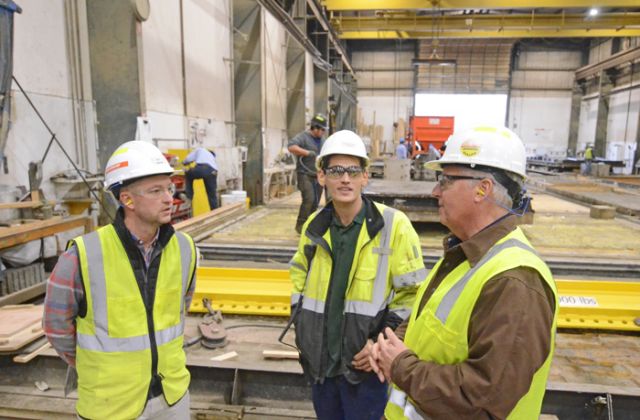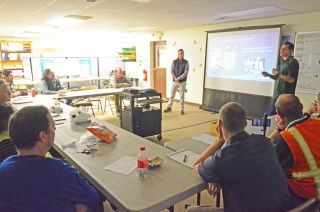Japanese factories inspire Smith-Midland to improve
December 11, 2019 | Associate / Plant News
By Lawrence Emerson Editor of FauquierNow.com
Two Liberty High School graduates traveled to Japan last month to help Fauquier County’s largest manufacturer improve efficiency.
Smith-Midland Corp.’s A.J. Krick and Vaughncarl Gardner joined “lean manufacturing” guru Paul A. Akers on a tour with 12 other business representatives from around the globe. In four days, Mr. Akers and Japanese colleagues led the group through 10 factories, a grocery store and an elementary school on the island of Kyushu, where 12.9 million people live and work.

Smith-Midland CFO A.J. Krick, Quality Control Manager Vaughcarl Gardner and CEO Ashley Smith have toured Japanese factories to learn more about “lean manufacturing.” – Photos/Lawrence Emerson
“Their attitude throughout all the factories, is work is meaningful. It’s social responsibility. They understand that.” — Smith-Midland Quality Control Manager Vaughncarl Gardner
Smith-Midland Corp.’s A.J. Krick and Vaughncarl Gardner joined “lean manufacturing” guru Paul A. Akers on a tour with 12 other business representatives from around the globe. In four days, Mr. Akers and Japanese colleagues led the group through 10 factories, a grocery store and an elementary school on the island of Kyushu, where 12.9 million people live and work.
In a presentation to 23 coworkers during their lunch break Friday at the precast concrete plant near Midland, Mr. Krick (LHS ’03) and Mr. Gardner (LHS ’06) shared their observations about Japan:
• Everyone takes responsibility.
• Survival requires cooperation and improvement.
• Work has great value in society.
• Waste hurts everyone.
• Cooperation trumps competition.
It begins in elementary school, where Mr. Akers starts his tours.
At lunch, “kids are expected to serve each other,” Mr. Krick explained. “It’s very precise, with no food waste” and no janitors. “The kids clean up the cafeteria.”
When they finish, all folded milk cartons fit neatly within one another.
“Each kid asks, ‘How can I do better?’ ” Mr. Gardner said.
At the grocery store, each cart has a scanner for the customer to keep a running tally of purchases, which a clerk reviews quickly at checkout.
Citizens of the island nation, with relatively few resources and a long history of isolation, constantly focus on increasing productivity and reducing waste.
Despite deep cultural, economic and political political differences with the U.S. — a constitutional monarchy, Japan has an emperor — the Asian nation has developed models for high-quality manufacturing that companies around the world emulate.
For a couple of decades after World War II, “Made in Japan” meant cheap to most consumers here. But, American engineer and statistician W. Edwards Deming helped Japanese industrial leaders develop systems for exceptional quality. Ironically, those methods have come back to the U.S. in recent decades.
“Now, Japan is synonymous with quality,” Mr. Gardner told his coworkers.
He and Mr. Krick saw it up close in Lexus, Toto, Honda Sun, Daihatsu and other factories.
They watched a worker halt production at Daihatsu when it took extra time to properly align a vehicle headlight.
“Stop and fix the problem,” Mr. Gardner said. “A car headlight has to line up perfectly before before the wall (across the production line) goes up.
“They’re not gonna pass that defect along.”
Mr. Krick added: “But, they’re not scared to stop the line.”
In fact, workers have an obligation to do so in a culture that regards problems as opportunities to improve.
They watched plant managers sweep floors and “go where the work is” — a mantra for lean manufacturing executives to avoid isolation from production.
That new Daihatsu plant, half the size of the one it replaced, maintains the same output — underscoring the pursuit of increased productivity.
“Their attitude throughout all the factories is work is meaningful,” Mr. Gardner said. “It’s social responsibility. They understand that.”
The Japanese also focus on efficient movement and often use musical sounds or visual cues for fast, easily-understood communication.
The manufacturers have a creed: “Slow is smooth. Smooth is fast.”
In other words: Focus on calm, methodical movement. Master it, and you will increase speed without making mistakes. The factories they toured maintain incredibly low defect ratios and high outputs.
As rigid as it all sounds, Mr. Krick said Japanese workers “are playful and have fun,” finding joy in doing their jobs well. Each day starts with group stretching other team-building rituals.
“They’re not trying to replace humans,” Mr. Gardner said. “There were some robots, but not as many as you’d think.”
How does all that apply to a big, sometimes messy precast concrete operation that makes highway barriers, architectural components and utility structures?
“We’ve been on the lean journey for a long time,” said Mr. Gardner, Smith-Midland’s 31-year-old quality control manager, who worked his way up after jobs elsewhere in construction and manufacturing.
CEO Ashley Smith and his brother Matthew, the company vice president for sales and marketing, took one of Mr. Akers’ tours in the spring of 2018.
“It’s really about everybody making things better every day,” Ashley Smith said. “The challenge for us as leaders is to get everybody involved.”
Founded in 1960 as his grandfather’s part-time business, Smith-Midland operates in a very competitive industry for multimillion-dollar contracts, where small problems get magnified and small improvements can yield big results.
The publicly-traded company in 2018 produced just more than $40 million in total revenue and a $1.7-million profit, according to its annual report.
Last year, Smith-Midland — with 150 employees in Fauquier and 50 in the Carolinas — spent $100,000 on training, according to the CEO. The Akers packages cost $4,800 per person, excluding travel, some meals and lodging before and after the tours. Three more employees will participate in a tour next spring.
Ashley Smith has become a big believer, adopting some of the subtle Japanese customs, such as walking out with guests, watching them leave the plant and waving as a sign of respect.
The four-man quality control team that Mr. Gardner leads runs an industry-certified lab that ensures every batch of concrete and every product meets standards for durability under a range of conditions.
As the chief financial officer, Mr. Krick, 34, wants to make sure he fully understands the products represented on spreadsheets.
The tour made him keenly aware of Japan’s focus on “survival — something we don’t talk about a lot here,” Mr. Krick said. “Everybody’s job is quality . . . .
“They’re thinking a lot deeper than we are.”
Contact Editor “Lou” Emerson at LKE@FauquierNow.com or 540-270-1845.

During lunch with coworkers Friday, A.J. Krick and Vaughncarl Gardner share their observations about Japanese factories. – Photos/Lawrence Emerson